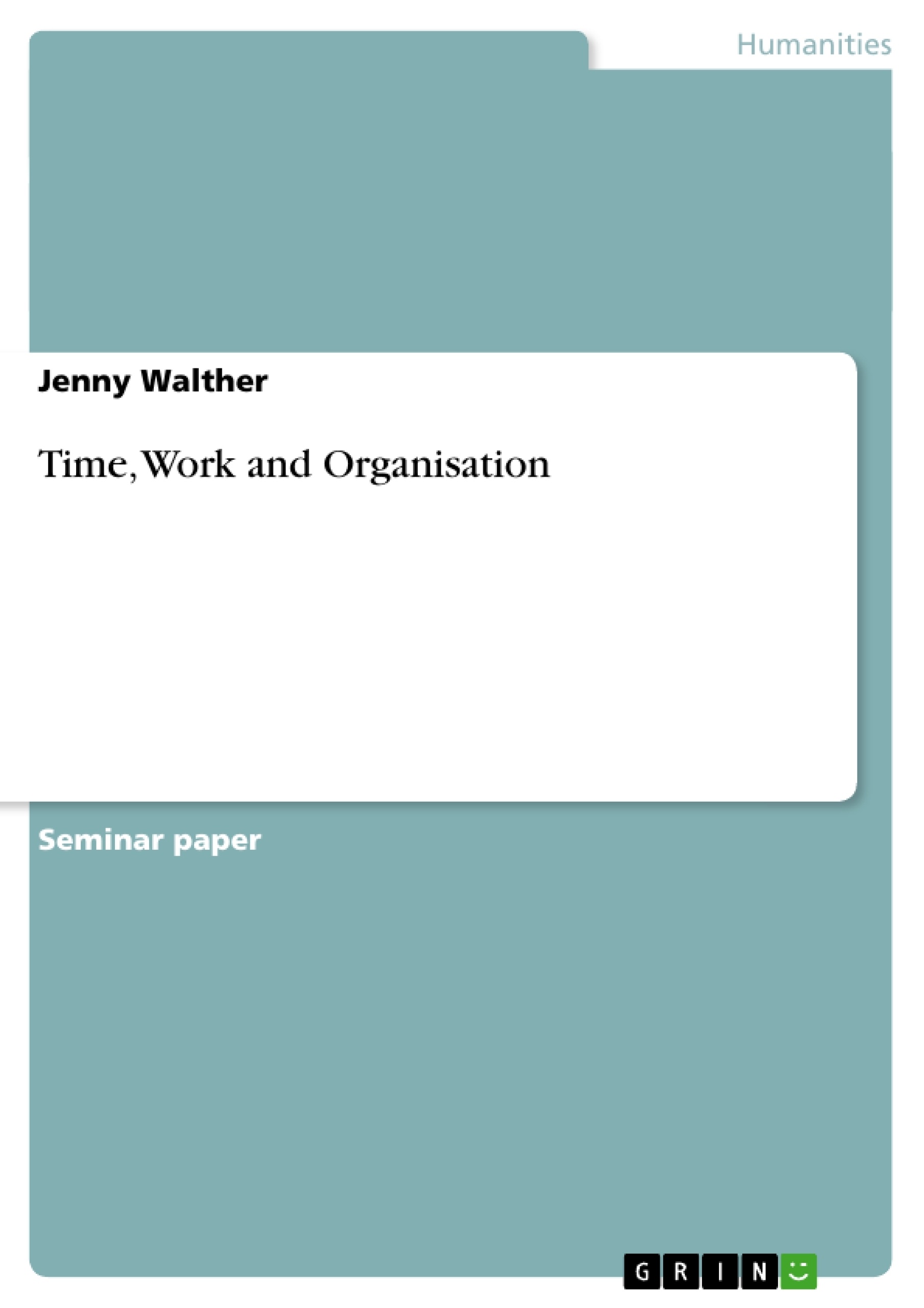Until our century the connection between work and the apprehension of time used to be a subject that was hardly observed. One of the main reasons may well be the fact that the everyday authority of time is so complete that it is usually taken for granted and, consequently, rarely appears to be problematic.
With increasing awareness of the complex time-work relation, this issue is nowadays discussed from different perspectives within as well as beyond the field of sociology.
To understand the sense of time and work in present days, it is interesting to examine how it has developed in history, especially under the influence of a changing industrial system. The focus of this essay will therefore be the question how capitalism has transformed the human sense of time. To discuss this I will concentrate on the theory of E. P. Thompson, its main ideas as well as arising problems and questions. I will start by outlining this theory in detail and continue to summarise its main points of criticism in connection with Richard Whipp's idea of an alternative model of time perception. Finally, I will conclude by giving a future outlook of the problem.
Inhaltsverzeichnis (Table of Contents)
- Introduction
- Thompson: Task- and Time-Orientation
- Overview
- Task-Orientation
- Time-Orientation
- Working patterns today
- Whipp: Criticism and Alternative Model
- Criticism of Thompson's theory
- Whipp's alternative model
- Summary and Future Outlook
Zielsetzung und Themenschwerpunkte (Objectives and Key Themes)
This essay explores the influence of capitalism on our perception of time, specifically focusing on the shift from task-orientation to time-orientation during industrialization. It examines E. P. Thompson's theory of time perception and its criticisms by Richard Whipp, ultimately aiming to understand how our sense of time and work has evolved under capitalism.
- The influence of capitalism on our perception of time
- The shift from task-orientation to time-orientation in the workplace
- The impact of industrialization on time-discipline
- The commodification of time under capitalism
- Criticisms of Thompson's theory of time perception
Zusammenfassung der Kapitel (Chapter Summaries)
- Introduction: This chapter introduces the concept of time and its relation to work, highlighting how capitalism has transformed our sense of time. It lays out the essay's focus on E. P. Thompson's theory and its criticisms, promising to examine the transition from task-orientation to time-orientation in the workplace.
- Thompson: Task- and Time-Orientation: This section presents E. P. Thompson's theory, which argues that the apprehension of time is shaped by the industrial system. It outlines the key concepts of task-orientation, prevalent in pre-industrial society, and time-orientation, which emerged with industrial capitalism. The chapter discusses the implications of these two orientations for work patterns, highlighting the role of time-discipline and the commodification of time under capitalism. It also examines the transition from task-orientation to time-orientation, acknowledging the challenges and resistance encountered by employers in imposing time-discipline.
- Whipp: Criticism and Alternative Model: This chapter explores Richard Whipp's critique of Thompson's theory. Whipp questions the extent to which employers could successfully instill a sense of time thrift in workers and challenges the linear progression from task-based to clock work. He argues that Thompson oversimplifies the process of change, suggesting that the transition was not continuous or easily achievable.
Schlüsselwörter (Keywords)
The essay focuses on the concepts of task-orientation, time-orientation, time-discipline, industrial capitalism, commodification of time, alienation of labor, and the transition from pre-industrial to industrial society. It delves into the theories of E. P. Thompson and Richard Whipp, analyzing their perspectives on the relationship between time, work, and social change.
Frequently Asked Questions
How did capitalism change our perception of time?
Capitalism shifted the focus from "task-orientation" (working until a job is done) to "time-orientation" (working according to the clock and specific shifts).
What is E.P. Thompson's theory on time?
Thompson argued that industrialization forced workers to adopt strict time-discipline, essentially commodifying time where "time is money."
What is the difference between task-orientation and time-orientation?
Task-orientation is based on natural cycles and the requirements of the work itself, while time-orientation is dictated by the clock, leading to a clear distinction between "work" and "life."
What was Richard Whipp's criticism of Thompson?
Whipp argued that the transition was not as linear or successful as Thompson suggested, noting that workers often resisted time-discipline and that different models of time perception coexisted.
What does "commodification of time" mean?
It refers to the capitalist practice of buying and selling labor by the hour, making time a valuable resource that must be spent efficiently and not "wasted."
Why was time-discipline difficult to impose?
Pre-industrial work patterns were irregular and deeply rooted in social traditions, leading to significant resistance against the rigid schedules required by factories.
- Arbeit zitieren
- Jenny Walther (Autor:in), 2000, Time, Work and Organisation, München, GRIN Verlag, https://www.hausarbeiten.de/document/37765


